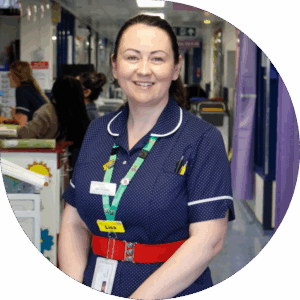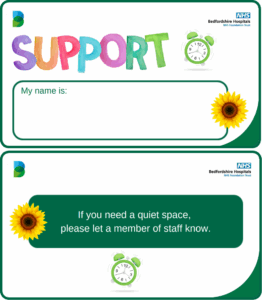Special Educational Needs and Disability (SEND)

Meet Lisa, Bedfordshire Hospitals’ Clinical Nurse Specialist in SEND and Transition for Children and Young People (YP).
What is a SEND Consent Form?
Your consultant will give you a consent form to sign, which gives consent to flag your child/YP on the hospital electronic record (IPM). This flag will alert all Bedfordshire Hospital staff that your child has additional needs.
What does the Green Clock mean?

The SEND flag is also known as the ‘green clock’. When in hospital, we use the green clock for our SEND patients to alert all staff that the patient may need extra time/support to meet the child’s/young person’s needs. We place the green clock next to the patients name on the patient board when admitted as an inpatient. If your child/YP is coming to hospital for day surgery, please make the nurse aware at the pre-operative assessment about any additional needs your child/YP has that we may need to be aware of. A green clock will then be put on to your child/YP’s paperwork alerting staff that we may need to put some reasonable adjustments in place.
If you have signed the consent form, you will be given a SEND card. You must write your child’s/YP’s name on the card.
The cards are plastic, so this may need to be written with a permanent marker or a Sharpie pen. Please bring the card with you whenever you visit Bedfordshire Hospitals. This card can be shown throughout all departments within the Trust so staff can recognize that your child/YP with SEND may need extra time and support.
Please be aware that the SEND card does not entitle your child/YP to jump the queue when waiting for an appointment.
The Accident and Emergency (A&E) departments are unpredictable and very busy environments. This can be extremely difficult for a child/YP with SEND needs, staff will try their best to make any reasonable adjustments for your child/YP. Bedford A&E department have a sensory room with resources, speak to a member of staff if you wish to use the sensory room while waiting in A&E.
Can my child/YP be supported through play in hospital?
Both sites have dedicated play services with sensory areas if your child/YP becomes overstimulated. If your child/YP is in a side room due to infection, the play specialists will come and bring resources to the room to suit your child’s age and development.
If your child needs preparation or distraction for a procedure/treatment, the play team can support your child/YP’s knowledge and understanding about the procedure.
A child-focused environment can be created within the playroom or at the child’s bedside. Play therapy can be adapted to help reduce anxiety, fear, and stress.
If you are attending an outpatients appointment within the Trust, Lisa and the play service can be contacted to come and support your child/YP.
When attending an outpatients appointment with my child/YP and need to access changing facilities, where do I go?
Luton site: If your child/YP needs changing facilities outside of the paediatric ward, there is a room named the Transport Room located in the surgical block, first floor, in Zone C. This room is equipped with a hospital bed, if you require any specialist equipment, for example a hoist, please ask a member of staff. If any further assistance is required with regards to changing facilities the paediatric unit is located in the surgical block on the fourth floor.
Bedford site: Riverbank ward has a Special Needs Bathroom with equipped changing facilities. This is located on the ground floor just across the corridor from children’s outpatients.
Visit the GP for an Annual Health Check
Please remember if your Young Person is 14 years and above and registered with a Learning Disability, they should be visiting their GP surgery for yearly Health Checks.
This is very important, as when the time comes to transition to adult care, the GP has a good holistic view of the young person to develop a Health Action Plan, ensuring the patient receives proactive, good, preventable care. Remember, you don’t have to visit the GP for illness: they can help with prevention rather than curing.
Local support
To learn more about SEND in your area
